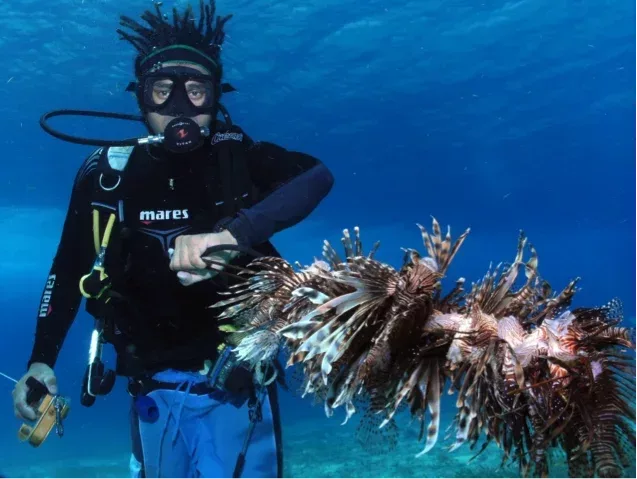The Ad Hoc Committee for the Caribbean Regional Response to the Lionfish Invasion (known as ‘Regional Lionfish Committee’) was established in November 2010 (GM24) in response to the growing threat caused by the invasion of the lionfish (Pterois volitans and Pterois miles) in the Wider Caribbean. The lionfish is native to Indo-Pacific coral reef ecosystems, and was introduced into Florida waters in the late 80s to later spread across the Wider Caribbean region, establishing itself as a highly problematic alien species that poses a serious threat to coral reefs in Bermuda, the America tropics of Florida, the Gulf of Mexico, the Caribbean islands, Central America, and northern South America.
The Regional Lionfish Committee (RLC) is the result of the combined efforts of UNEP-Caribbean Environment Programme (UNEP-CEP) and its Regional Activity Center for the Protocol on Specially Protected Areas and Wildlife of the Cartagena Convention (SPAW-RAC); and partners including the government of Mexico and its Commission on Protected Areas (CONANP), the government of the USA and its National Oceanic and Atmospheric Administration (NOAA), Reef Check Dominican Republic, CABI, REEF and representative Caribbean experts. At the last ICRI Meeting (October 2014), new Terms of Reference were adopted.

Activities & achievements
The RLC is one of the most active ICRI Committees. Since its creation in 2010 it has produced a number of outputs including:
- Supporting Costa Rica to develop a National Strategy for the Control of Invasive Lionfish in Costa Rica with a workshop held on 25-26 February 2014. See the workshop report (in Spanish)
- Release of the “Regional Strategy for the Control of Invasive Lionfish in the Wider Caribbean“.
- The release of an ICRI Host Advisory Statement in three languages which seeks to draw international attention to the lionfish issue.
- The production, launch, release and translation of a best practice manual entitled: Invasive lionfish: a Guide to Control and Management.
- The joint writing and development of a Regional Lionfish Control Strategy, which intends to provide a framework to help guide action by stakeholders concerned with, and impacted by, the lionfish invasion.
- The organisations of specialized, technical workshops on the lionfish invasion.
- The development of a lionfish webportal to facilitate ongoing regional communication, compile scientific information related to lionfish, and provide access to best management practices and manager-training tools.
- The compilation of a contacts list of lionfish stakeholders (currently hosted by CAR-SPAW).
- Numerous presentations at regional and international conferences and fora (PDF File) on the lionfish invasion in the Caribbean.
Terms of Reference
- Amended Terms of Reference – ICRI Ad-Hoc Committee on Caribbean Regional Response to Lionfish Invasion (GM26)
- Terms of Reference- ICRI Ad-Hoc Committee on Caribbean Regional Response to Lionfish Invasion (GM25)
Other ICRI Documents related to this AHC
- Workshop report (in Spanish) develop a National Strategy for the Control of Invasive Lionfish in Costa Rica
- “Regional Strategy for the Control of Invasive Lionfish in the Wider Caribbean“
- RLC Report to ICRI (GM28)
- RLC Report to ICRI (GM27)
- RLC Report to ICRI (GM26)
- ICRI Host Advisory Statement on the lionfish invasion in the Caribbean
- Invasive Lionfish: A Guide to Control and Management
- Poster on the lionfish invasion (presented at SBSTTA-16 on 30 April 2012)
- RLC Presentation to MarCuba – spanish (October 2012)
- RLC Presentation to the Caribbean Regional Fisheries Mechanism (March 2012)
- Lionfish Webportal Factsheet
Related documents
- The lionfish: an example of invasive species (GM24)
- The lionfish: two species (GM24)
- WCR lionfish timeline – Regional Activities
- The lionfish cookbook: the Caribbean’s new delicacy (REEF)
Related websites
- Distribution map of lionfish invasion (USGS) and Animated map (USGS)
- Gulf and Caribbean Fisheries Institute (GCFI) and Lionfish
- Lionfish population control in the French West Indies (in French)
- Lionfish Research Program (REEF)
- Information on Lionfish (USGS)
- Invasive Lionfish (Center for Coastal Fisheries and Habitat Research)
- CAB International
- The IndoPacific Lionfish Invasion (NOAA CoRIS)
For more information on this AHC contact the ICRI Secretariat.
